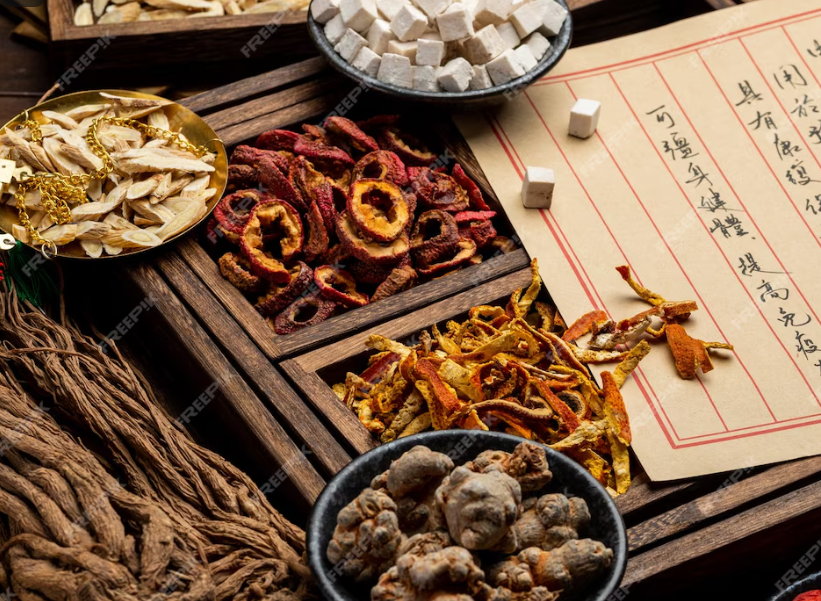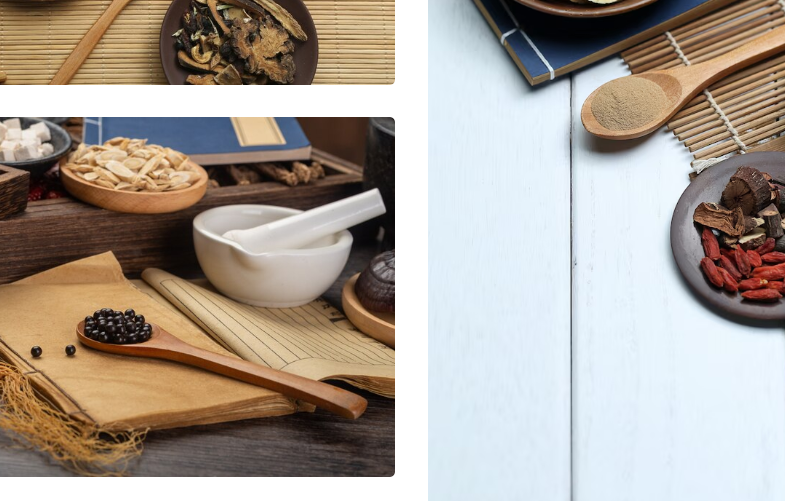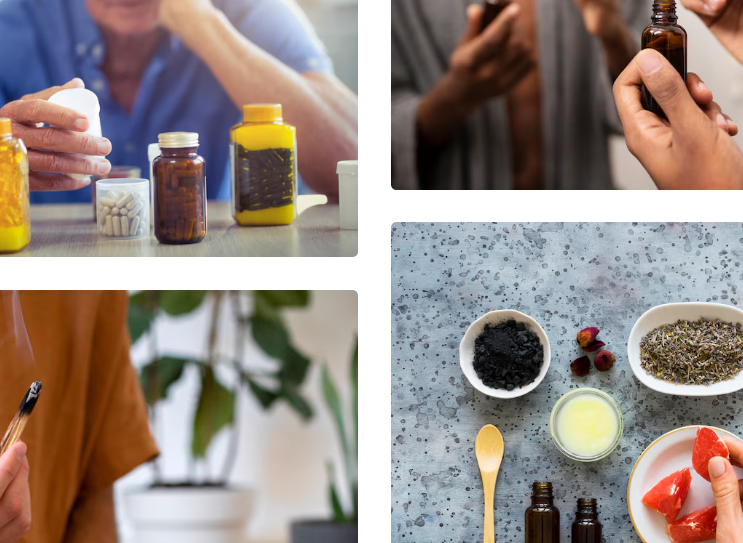Introduction to Herbal Formulas
In Traditional Chinese Medicine (TCM), herbal formulas are carefully crafted blends of natural ingredients, including roots, leaves, flowers, seeds, and minerals. These formulas are designed to restore balance, support the body’s healing processes, and address the underlying causes of illness.

Each herbal formula is tailored to the individual, taking into account their unique constitution, symptoms, and the specific pattern of imbalance identified through diagnosis. TCM practitioners use these formulas to enhance the body’s natural vitality, boost immune function, and promote long-term wellness.
Unlike conventional medicine, which often isolates individual compounds, Chinese herbal formulas work synergistically—each herb supporting and enhancing the effects of the others. This holistic approach ensures a balanced and harmonious healing process.
TCM Herbal Preparations
Traditional Chinese herbal medicine employs multiple preparation methods, with three primary forms most commonly prescribed for oral administration:
- Raw Herbs (煎药, Jiān Yào)
- Granules or Powders (颗粒, Kē Lì)
- Pills or Tablets (丸剂, Wán Jì)
What they are: These herbs are typically boiled to make decoctions or used in other traditional methods of preparation.
Best for: Strong, customisable treatments (e.g., chronic or complex conditions).
Pros: Most potent and adjustable.
Cons: Time consuming to prepare; A bitter or sometimes unpleasant taste.
What they are: These are concentrated herbal extracts made by processing raw herbs and turning them into small, water-soluble particles that dissolve easily in hot water.
Best for: Convenience without sacrificing much potency.
Pros: They have a high concentration of active ingredients, often providing the same medicinal effect as a decoction, without the lengthy preparation.
Cons: Slightly less customisable than raw herbs.
What they are: They are pre-formed tablets made from powdered herbs that have been compressed into a solid form. They are convenient and often available in standardised dosages.
Best for: Longterm, mild conditions (e.g., fatigue, mild digestion issues).
Pros: Easy to take; no preparation needed.
Cons: Slower absorption; less potent than decoctions or granules.
Additional formats — including syrups, capsules, and topical ointments or creams — are also available in clinical practice.
At Gleamy Acupuncture Centre, we primarily utilise herbal granules, offering a refined and effective approach to Traditional Chinese Medicine. Our expertise lies in formulating fully customised herbal prescriptions by meticulously blending individual granules to address each patient’s specific condition.

Based on extensive clinical experience, we have found that these concentrated herbal extracts deliver optimal therapeutic efficacy while maintaining modern convenience—easily dissolved in water for rapid absorption and consistent results.
Unlike standardised pre-mixed formulas, our tailored methodology ensures precise alignment with your diagnosis, enhancing treatment outcomes by leveraging the targeted benefits of each herb. This patient-centric approach reflects our commitment to both traditional principles and contemporary healthcare standards.
Quality Assurance
We exclusively use premium herbal granules from ethically and sustainably sourced suppliers. Every custom formula is crafted with meticulous care to ensure quality, potency, and therapeutic effectiveness.
Our herbal treatments are designed to synergise seamlessly with your acupuncture sessions, offering a holistic approach to restore and maintain your well-being.
How to Take Herbal Granules
Please follow the instructions:
- A single bag of granules is made for 2 drinks, and usually for one day.
- Empty the ENTIRE contents of the bag into a cup; DO NOT divide.
- Add approximately 250-300ml of boiling water to the cup and stir until the granules dissolve.
- Drink the herbs when the temperature is appropriate, twice a day, 30 - 60 minutes before or after meals, as directed for your specific prescription. If you get an upset stomach after taking this medicine, try taking it immediately after meals.
- If you are taking other medicines, it is recommended that they are separated by 1-2 hours.
- You can warm the granules either by adding a little more hot water or by heating them in the microwave for 10-20 seconds.
PS: As the processing technique of each herbal granule is different, if the granule does not dissolve completely in the water, please drink the remaining substance to ensure the best effectiveness of the medicine.
Important Precautions:
- Avoid raw or cold foods if treating dampness or spleen deficiency
- Limit greasy or spicy foods—may reduce effectiveness of heat-clearing herbs
- No alcohol—can alter herb potency
- Consistency is key: Herbs work cumulatively (typically require weeks/months of use)
When to Expect Results
- Acute concerns: Improvement within days to 2 weeks
- Chronic conditions: Allow 1–3 months (with formula adjustments)
More questions? Click here.
Safety Guide: Using TCM Alongside Western Medications

At Gleamy Acupuncture Centre, we prioritise your safety and the effectiveness of your treatment. While Chinese herbal medicine offers powerful healing benefits, it is important to use it wisely—especially if you are taking prescription medications.
1. Always Consult Your Practitioners
- Inform your TCM herbalist about all medications and supplements you take.
- Tell your Western doctor about any herbs in your regimen—some may interact with prescriptions.
- Never self-prescribe herbal formulas when taking pharmaceutical drugs.
2. Proper Timing Reduces Risks
- Space out doses: Take herbs and medications 2–3 hours apart to minimize interactions.
- Follow instructions carefully: Some herbs work best on an empty stomach, while others should be taken with food.
3. Monitor Your Body’s Response
- ✔ Normal adjustments: Mild bloating or changes in digestion or energy levels may occur as your body adapts.
- ✖ Warning signs (stop use and contact us immediately):
- Unexplained bruising or bleeding (may indicate a blood-thinning interaction)
- Severe dizziness, fatigue, or irregular heartbeat (possible blood pressure or blood sugar effects)
- Skin rashes, itching, or digestive distress (may signal an allergy or irritation)
4. High-Risk Combinations to Avoid
Some herbs require special caution when taking certain medications, including blood thinners (such as Warfarin or Aspirin), blood pressure medications, diabetes medications, and sedatives or antidepressants.
Your Safety Comes First
We customise every herbal prescription based on your health profile. If you experience any unexpected reactions or have concerns about interactions, please contact us right away — we are here to ensure your treatment is both effective and safe.
